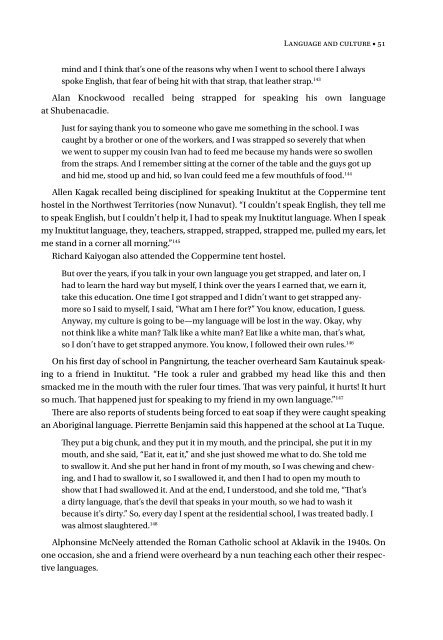The Survivors Speak
1MB8J05
1MB8J05
Create successful ePaper yourself
Turn your PDF publications into a flip-book with our unique Google optimized e-Paper software.
Language and culture • 51<br />
mind and I think that’s one of the reasons why when I went to school there I always<br />
spoke English, that fear of being hit with that strap, that leather strap. 143<br />
Alan Knockwood recalled being strapped for speaking his own language<br />
at Shubenacadie.<br />
Just for saying thank you to someone who gave me something in the school. I was<br />
caught by a brother or one of the workers, and I was strapped so severely that when<br />
we went to supper my cousin Ivan had to feed me because my hands were so swollen<br />
from the straps. And I remember sitting at the corner of the table and the guys got up<br />
and hid me, stood up and hid, so Ivan could feed me a few mouthfuls of food. 144<br />
Allen Kagak recalled being disciplined for speaking Inuktitut at the Coppermine tent<br />
hostel in the Northwest Territories (now Nunavut). “I couldn’t speak English, they tell me<br />
to speak English, but I couldn’t help it, I had to speak my Inuktitut language. When I speak<br />
my Inuktitut language, they, teachers, strapped, strapped, strapped me, pulled my ears, let<br />
me stand in a corner all morning.” 145<br />
Richard Kaiyogan also attended the Coppermine tent hostel.<br />
But over the years, if you talk in your own language you get strapped, and later on, I<br />
had to learn the hard way but myself, I think over the years I earned that, we earn it,<br />
take this education. One time I got strapped and I didn’t want to get strapped anymore<br />
so I said to myself, I said, “What am I here for?” You know, education, I guess.<br />
Anyway, my culture is going to be—my language will be lost in the way. Okay, why<br />
not think like a white man? Talk like a white man? Eat like a white man, that’s what,<br />
so I don’t have to get strapped anymore. You know, I followed their own rules. 146<br />
On his first day of school in Pangnirtung, the teacher overheard Sam Kautainuk speaking<br />
to a friend in Inuktitut. “He took a ruler and grabbed my head like this and then<br />
smacked me in the mouth with the ruler four times. That was very painful, it hurts! It hurt<br />
so much. That happened just for speaking to my friend in my own language.” 147<br />
<strong>The</strong>re are also reports of students being forced to eat soap if they were caught speaking<br />
an Aboriginal language. Pierrette Benjamin said this happened at the school at La Tuque.<br />
<strong>The</strong>y put a big chunk, and they put it in my mouth, and the principal, she put it in my<br />
mouth, and she said, “Eat it, eat it,” and she just showed me what to do. She told me<br />
to swallow it. And she put her hand in front of my mouth, so I was chewing and chewing,<br />
and I had to swallow it, so I swallowed it, and then I had to open my mouth to<br />
show that I had swallowed it. And at the end, I understood, and she told me, “That’s<br />
a dirty language, that’s the devil that speaks in your mouth, so we had to wash it<br />
because it’s dirty.” So, every day I spent at the residential school, I was treated badly. I<br />
was almost slaughtered. 148<br />
Alphonsine McNeely attended the Roman Catholic school at Aklavik in the 1940s. On<br />
one occasion, she and a friend were overheard by a nun teaching each other their respective<br />
languages.


